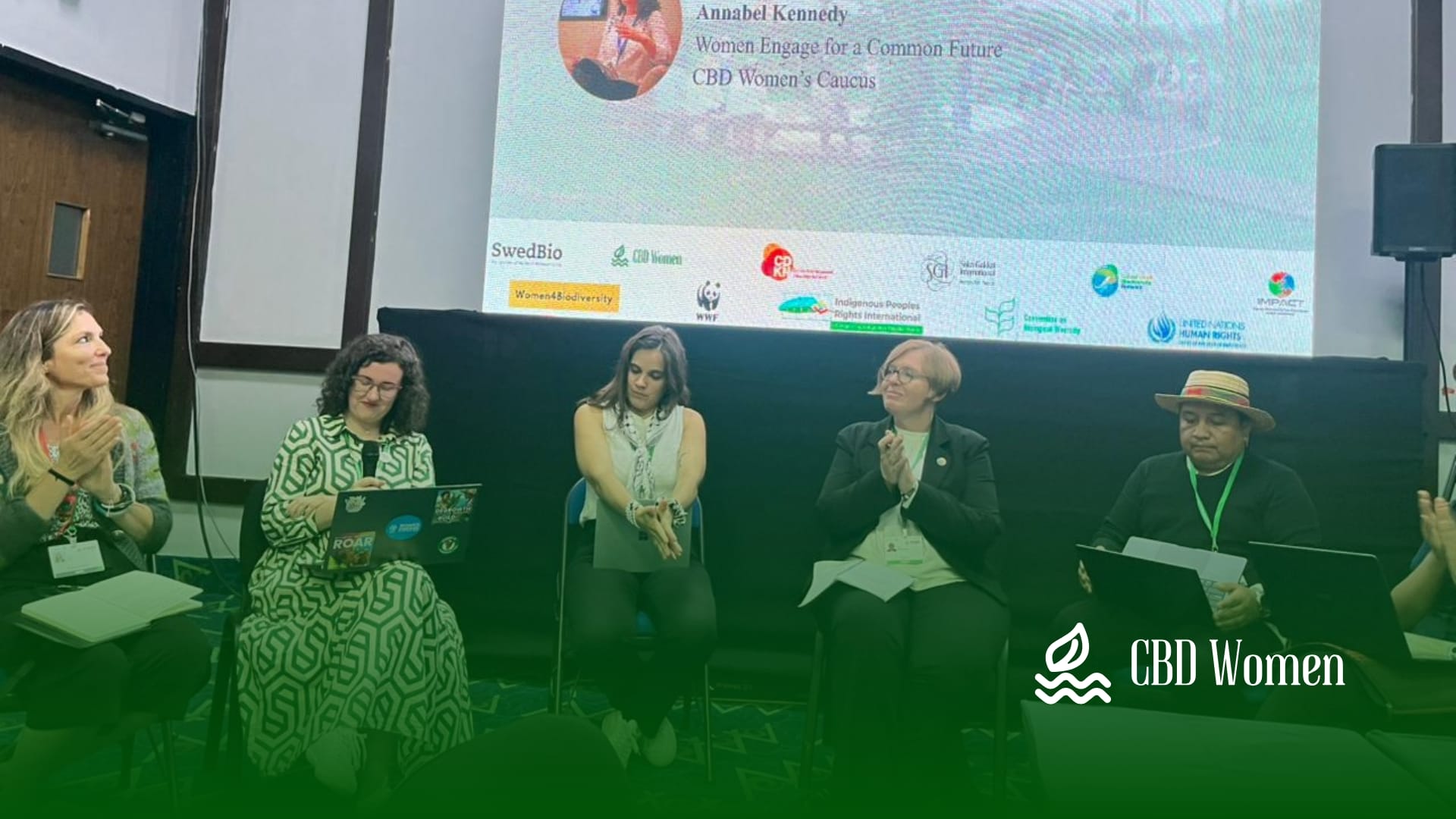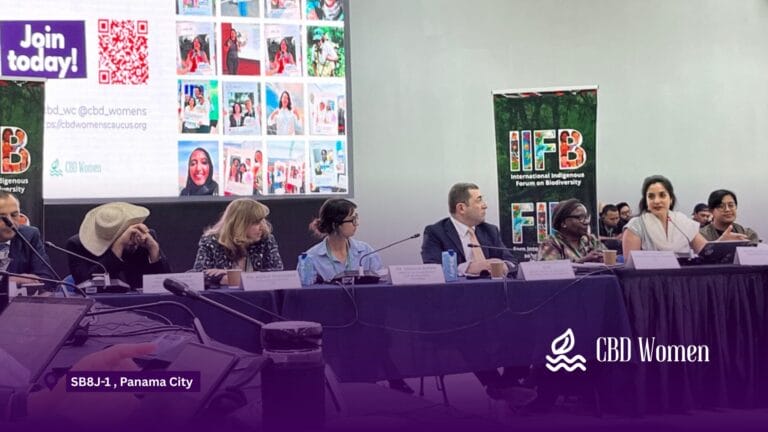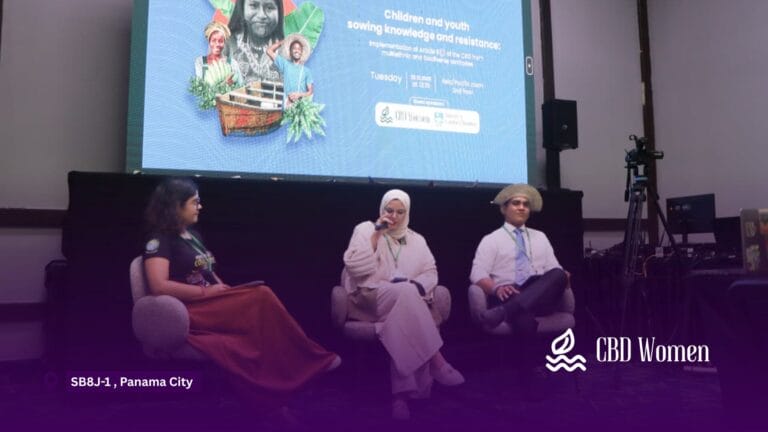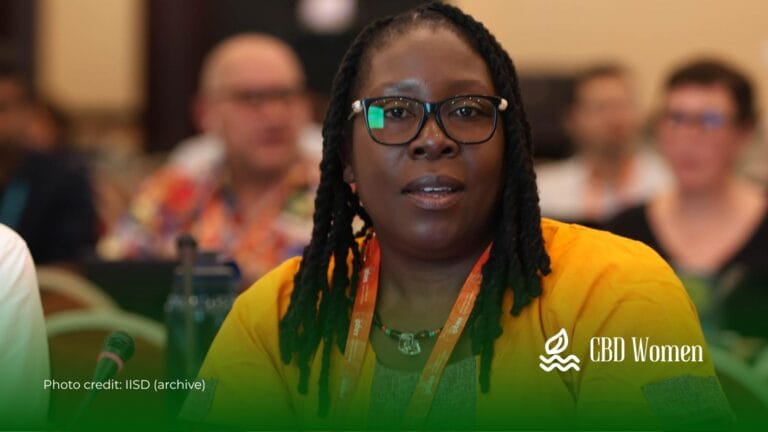On 23 October 2025, during SBSTTA-27 in Panama City, the Human Rights and Biodiversity Working Group hosted the side event “Aligning Voices: Multi-Actor Pathways for Just and Equitable Policy Coherence across the Rio Conventions.” The event brought together governments, civil society, Indigenous Peoples, youth, women’s organizations, research institutions, and UN bodies to explore how biodiversity, climate, and land governance can be aligned through human-rights-based, participatory, and equitable approaches.
The discussion emphasized that biodiversity loss, climate change, and land degradation are interconnected crises that require coordinated and inclusive solutions. By integrating the perspectives and lived experiences of diverse actors, the event highlighted pathways to strengthen policy coherence across the Rio Conventions, ensuring that environmental action advances justice, equity, and sustainable outcomes.
Participants shared experiences from the local to global levels, demonstrating how human rights, gender justice, and Indigenous leadership can guide policy design, implementation, and monitoring. The side event aimed to provide actionable insights for enhancing coherence among NBSAPs, NDCs, NAPs, and LDN targets, while fostering a shared understanding of the enabling conditions needed to support just and inclusive environmental governance.
Speakers and Key Contributions
Ms. Nela Černota – Associate Human Rights Officer at OHCHR. Nela highlighted the systemic links between environmental crises and social inequality, emphasizing that Indigenous Peoples, women, and local communities are disproportionately affected. She stressed the importance of grounding policies in human rights and participatory approaches to ensure equity and effectiveness.
Mr. Tristan Tyrrell – Programme Management Officer for Biodiversity, Climate Change and Dry & Subhumid Lands, Secretariat of the CBD
Tristan emphasized the need for long-term, equitable human-rights-based approaches to policy coherence across the Rio Conventions. He highlighted the integration of human rights into national biodiversity, climate, and land governance policies, and the importance of leveraging existing frameworks to strengthen sustainable implementation.
Ms. Flore Ghetti -Global Youth Biodiversity Network – Program Coordinator – Environment & Sustainability, and Youth at Soka Gakkai International.
Flore focused on youth perspectives and the challenges of fragmented governance. She highlighted the importance of cross-convention synergies, structured collaboration, and the creation of platforms that enable accountability and coherent implementation of global environmental targets.
Ms. Annabel Kennedy- CBD Women’s Caucus (Women Engage for a Common Future) Annabel emphasized the central role of gender justice and equity in environmental governance. She highlighted the recognition of women and girls as leaders and knowledge holders, who are already implementing synergistic solutions in their communities. She stressed the need for inclusive resource allocation, and the importance of land tenure in climate and biodiversity policy frameworks.
Mr. Gustavo Ulcué Campo – Representative of the National Indigenous Organization CNTI, Colombia
Gustavo shared Indigenous perspectives on biodiversity and climate governance, emphasizing the cultural and spiritual importance of Indigenous territories. He highlighted the role of Indigenous governance, autonomy, and community-led conservation as essential for effective and equitable outcomes, and called for policies that respect and strengthen existing Indigenous systems.
Ms. Britta Hackenberg CBD National focal point- Britta highlighted the role of communities in policy implementation, emphasizing the importance of devolving rights, documenting traditional knowledge, and ensuring participatory approaches that strengthen both conservation and social outcomes. Namibia’s early experience with Access and Benefit-Sharing (ABS) frameworks was shared as a model for community engagement.
Ms. Nadia Sitas –Ecosystem-Based Adaptation Thematic Lead for CDKN at SouthSouthNorth & Senior Researcher at Centre for Sustainability Transitions (CST) Nadia emphasized the importance of evidence-based policy integration, demonstrating how human rights, gender, and environmental considerations can inform equitable and sustainable policy coherence. She stressed the value of diverse knowledge systems in building inclusive and actionable solutions across the Rio Conventions.
Key Themes and Insights
- Human Rights and Equity – Integrating human rights, gender equality, and intergenerational equity is essential for effective environmental governance.
- Policy Coherence Across Conventions – Coordinated implementation and monitoring of the Rio Conventions prevents fragmentation and duplication.
- Indigenous and Local Leadership – Indigenous Peoples and local communities are central to conservation, climate resilience, and effective policy implementation.
- Youth and Women’s Participation – Recognizing and supporting the leadership of youth and women strengthens sustainability and results in more holistic solutions.
- Evidence and Knowledge Integration – Leveraging diverse knowledge systems and evidence-based approaches ensures that policies are practical, equitable, and effective.
Conclusion
The side event highlighted that achieving just and equitable policy coherence across biodiversity, climate, and land agendas requires collaboration, inclusion, and human-rights-based approaches. Aligning policies through these lenses not only improves effectiveness but also ensures that actions respect and empower those most affected. Coherent governance is not only a technical goal but a pathway to justice, sustainability, and resilient communities, demonstrating that environmental protection and human rights are inseparable.




